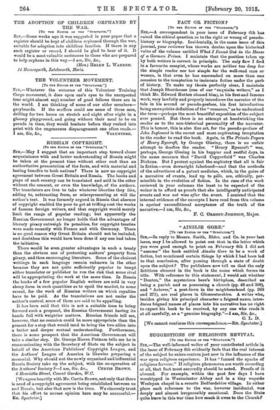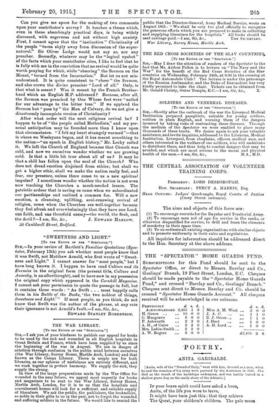SUGGESTIONS OF RELIGIOUS REV/VAL.
[To tea EDITOR. O. TM "Errcra5o5., SIR,—The well-informed writer of your contributed article in the issue of February 6th evidently feels that the real interest of the subject he raises centres just now in the influence of the war upon religious experience. It has "fanned the sparks of religious fervour." If religious phenomena are worth recording at all, that fact most assuredly should be noted. Proofs of it abound. For example, within the past few days I have worshipped in Westminster Abbey and in a tiny wayside Wesleyan chapel in a remote Bedfordshire village. In either place each reference to the war, however incidental, was deeply and almost irrepressibly emotional. Does the State quite know in thee war time how much it owes to the Church?
Can you give me space for the making of two comments upon your contributor's survey ? It touches a theme which, even in these absorbingly practical disys, is being widely discussed, with eagerness and not without high anxiety. First, I cannot agree that the " instinctive " Christianity of the people "turns shyly away from discussion of the super- natural." Sir Oliver Lodge would not say so, nor any preacher. Secondly, whatever may be the "logical upshot" of the facts which your contributor cites, I like to feel that he is fully with me in the conviction that no revival would be quite worth praying for which, while "cheering" the Sermon on the Mount, "turned from the Incarnation." But let us not mis- understand. It is quite consistent to " cheer " the Sermon, and also crown the divine preacher "Lord of all." Only, is that what ie meant ? Was it meant by the French Brother- hood which an English M.P. addressed ? Because, after all, the Sermon was preached by One Whose feet were "nailed for our advantage to the bitter tree." If we applaud the Sermon but "pass by" the Man of Calvary, do we not give a disastrously incomplete version of Christianity?
After what order will the next religious revival be ? I happen to be of "the people called Methodists," and my per- eonal anticipation may be founded more than I know upon that circumstance. "I felt my heart strangely warmed"—that is where we Wesleyan began, and it has meant something to the nation—" an epoch in English history," Mr. Lecky called it. We left the Church of England because that Church was cold, and now we ourselves wonder whether we are growing cold. Is that a little bit true about all of us P It may be that a chill has fallen upon the soul of the Church ? Who does not dread emotion disjoined front ethics; but shall we get a higher ethic, shall we make the nation really feel, and fear, our presence, unless there come to us a new spiritual impulse? I sometimes wonder whether the nation is not even now teaching the Churches a much-needed lesson. The patriotic ardour that is saving us came when we subordinated our partisanships and realized a common foe. Will a new emotion, a cleansing, uplifting, soul-renewing revival of religion, come when the Churches are well-together because they feel afresh and overwhelmingly that they have one Lord, one faith, and one threefold enemy—the world, the flesh, and
the devil ?—I am, Sir, .4r.c , J. EDWARD HARLOW. 30 Cauldwell Street, Bedford,







































 Previous page
Previous page